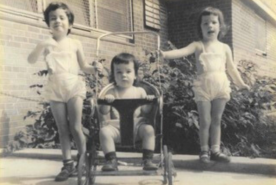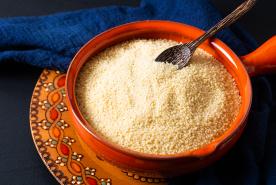September 27, 2022
A recent survey1 of people on hemodialysis found that itching, also known as chronic kidney disease-associated pruritus or CKD-aP, was common, with 61% self-reporting the itch was at least “somewhat intense” and 25% reporting it was “very” or “extremely intense.” About half of those surveyed also said that pruritus led to skipped or shortened hemodialysis sessions.
What causes the itching, and what can be done to stop it? Three people living with kidney disease and pruritus are here to share their experiences and offer hope to others in a similar situation: Jen Trunk, Alex Barrios, and Dawn Edwards.
What is CKD-aP?
Those with end-stage kidney disease are most likely to experience very itchy skin, but it can also occur in those in earlier stages. The sensation can happen anytime and range from mild to unbearable.
The most common areas affected by pruritus include the:
- face
- back
- arms
- vascular access
"It's like pins and needles inside my skin. Sometimes it will start with a light physical touch and ramp up. I will scratch a little bit and the tingles will get stronger. Then I'll scratch more and it just never stops," said Jen. "It's impacted my life greatly and it's maddening when it happens. It's impossible to do anything. I've had to pull over on the side of the road while I'm driving because I can't focus. I can't hold conversations once it's started."
People with pruritus may also notice symptoms worsening after exposure to extreme hot or cold temperatures, stress, physical activity, and showering.
Join the NKF Blog Newsletter
Get inspirational stories and kidney disease resources delivered to your inbox every month. You'll gain practical insights and expert advice to help you better understand and manage your kidney health no matter where you are on your kidney journey. Subscribe today.
What causes CKD-aP?
Unfortunately, the cause is not fully known. However, there are several possible reasons why those with kidney disease experience chronic itching.
Reasons you may experience pruritus:
- The body attacks itself and becomes inflamed and itchy.
- Nerve problems send the wrong signals to the skin.
- Damaged kidneys cause a build-up of toxins and wastes.
- Shrinking sweat glands cause very dry skin.
- The body makes chemicals that cause allergy symptoms like itching.
- Hemodialysis treatments are not long enough or do not fully clean the blood.
"Pruritus is an ongoing journey throughout my life with chronic kidney disease. It started in the very beginning before I even started dialysis. I would notice myself itching on my back, especially, but all over my body," said Alex. "I found that to be pretty puzzling and it took me some time to figure out what was making me itch. When I finally went into dialysis, I learned that that was one of the symptoms of end-stage kidney disease. That's when I was able to talk to my care team and try to find some type of resolution for this problem."
How is CKD-aP Treated?
You don't have to suffer in silence: There are many different options to help control the itch. Not receiving proper care can lead to loss of sleep, shorter or missed dialysis sessions, fatigue, depression, and infections, among other problems.
Pruritus treatments include:
- Creams and lotions for moisture and comfort
- Pills that help nerve and allergy problems.
- Special lights to reduce inflammation.
- Drugs to help bind wastes like phosphate and balance calcium and vitamin D
- For hemodialysis patients, a new drug called difelikefalin is available.
- Experimental treatments like omega-6, omega-3 fatty acids, and drugs that bind toxins in the gut.
Treatment varies from person to person, so speak with a healthcare professional to create a plan that works for you. For Dawn, this process included trying different creams, cold showers, and eventually more dialysis treatments.
"I went to the dermatologist's office and was given different lotions to manage my itching problem. Cold showers helped a little bit too. As a dialysis patient, I was on medications like Benedryl so that it would be under control during dialysis. After treatment, it was right back to itching again," Dawn said. "What I found to be specifically helpful was when I transitioned to home dialysis and started doing treatments more often. That's when I noticed the itching become more under control."
Advice From Those Living with CKD-aP
Living with kidney disease and pruritus can be incredibly challenging, but Alex, Dawn, and Jen want you to know there is hope.
"I will tell those with this condition to not give up or lose hope. Know that you aren't crazy. This is a true condition that will impact your life," Alex said. "It is a discussion that definitely needs to be had with your care team and your family. Continue to be your best advocate and you'll see some relief but it's not going to be perfect."
As your own advocate, don't be afraid to push your healthcare team to find and try new solutions–especially if what you're experiencing isn't properly addressed.
"Whether you have itching or you're in pain, it's something that you should talk to your care team about. That's very important and it's a part of staying healthy. Talk to your doctors if you're having problems,” said Dawn. “Be open, honest, and don't give up. If they haven't addressed your problem, go back and ask them again. Don't stop asking until you receive some type of resolution."
Finally, talk about what you're experiencing with others. You may find it helpful to be with a community of people who understand or find new treatment ideas to bring to your healthcare team's attention.
"There are several kidney groups where you can talk to other people that are facing these same things and try to find advice that works for you," Jen said. "Now, I am functioning and I can live a relatively normal life. This is something that will always be there but I am just not letting it stop me."
Get matched with a Peer Mentor who has lived with pruritus. You can also connect with others in a similar situation on our Kidney Communities or Facebook.


















